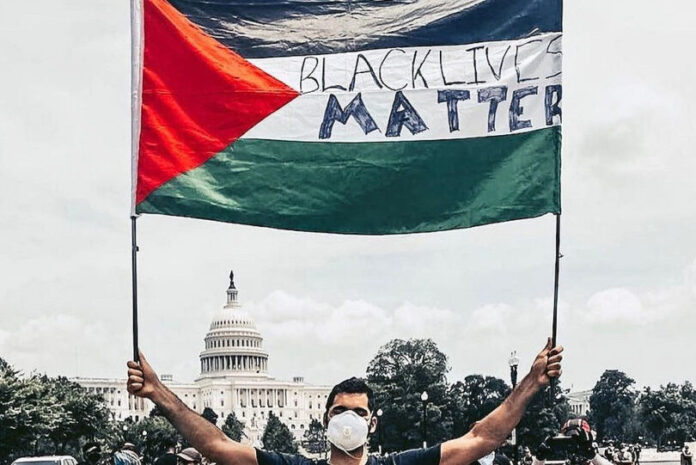
By Stacy M. Brown, NNPA Newswire Senior National Correspondent
Writer, speaker, and author Leron L. Barton recently encapsulated the essence of solidarity between Black Americans and Palestinians, comments that offer one potential reason America continues to see pro-Palestine demonstrations at the White House and in locations throughout the nation. Importantly, Barton’s op-ed in Newsweek is a reminder of why President Joe Biden will continue to struggle to obtain the type of support from the Black community that helped propel him into office in 2020.
“Black American and Palestinian solidarity is not only rooted in struggle but hope, fighting, resilience, laughter, endless battling, sadness, and doing it all over again the next day,” Barton observed. “This is what I see for my Palestinian brothers and sisters trying to hold on to a land that does everything it can to make them let go.”
Barton’s words resonate with many, capturing the indomitable spirit that defines both communities’ quests for justice and self-determination. His sentiment extends to his sorrow for the lives lost on all sides of the conflict. He stressed the importance of seeing the situation not just as “The Conflict,” but as “The Occupation,” recognizing the power dynamics involved.
The author underscored his belief that the struggles faced by Black Americans and Palestinians are intertwined. “This is why I cry for the deaths of Palestinian and Israeli people,” he declared. “This is why I do not refer to it as ‘The Conflict,’ but as ‘The Occupation.’ This why I have hope for and will continue to support Palestine as they fight to be recognized as people, human beings that deserve freedom and equal treatment as their Israeli neighbors, just as I, a Black man, will continue to fight for the freedom of my people in America. Our struggle is intertwined. When they win, we win.”
The 2018 book “Black Power and Palestine: Transnational Countries of Color” by Michael Fishbach echoes the sentiments put forth by Barton. Fishbach delves into how conflicts in the Middle East significantly influenced the American Civil Rights Movement. He asserts, “Much about how American peoples of color create political strategies, a sense of self, and a place within U.S. and global communities.”
According to Fishbach, the events of the 1960s and 1970s continue to have a profound, structural impact on the United States. This historical perspective underscores the enduring influence of these interconnected struggles.
Recent controversies have illuminated the complexities of solidarity movements. Black Lives Matter Chicago received criticism for posting a graphic that appeared to celebrate Hamas’ violent attack on civilians at a concert. The graphic has since been deleted. The image featured a paraglider with the Palestinian flag and the words “I stand with Palestine.” The incident prompted a nuanced conversation about the expression of support for a cause. The group later clarified, stating, “We stand with Palestine and the people who will do what they must to live free.”
Historians said the connection between the Black American and Palestinian struggles has been evident for many years. The proximity of protests over the Gaza war and the shooting of Michael Brown in Ferguson, Missouri, led to a cross-cultural exchange of advice on dealing with tear gas that included Bassem Masri, a prominent activist in Ferguson and a Palestinian American. In 2015, Black activists and Palestinian advocates displayed their support for each other by visiting occupied territories and making public statements of solidarity.
In 2020, George Floyd’s murder by the police led to protests across the U.S., with comparisons made to the situation faced by Palestinians. Sam Klug, an expert in African American History, highlighted the resonance of the phrase “I can’t breathe” in both contexts. “People were painting George Floyd murals in Palestine,” Klug explained. “Palestinians were being attacked by Israeli security services, and saying, ‘I can’t breathe.’ Over time, African Americans have looked at Palestine, and Palestinians have also looked at what is going on in the United States.”
Against this backdrop, Democrats have grown increasingly attuned to the challenges facing Biden’s reelection campaign. Concerns, and even alarms, have sounded regarding Biden’s support among Black voters, a pivotal demographic in his 2020 victory. Cliff Albright, co-founder of the Black Voters Matter Fund, said that supporting Biden for practical reasons might not mean being equally enthusiastic. Disillusionment over policies and stances, including Biden’s stance on Israel, may influence voter engagement in the upcoming 2024 election, Albright told the Washington Post.
“People fundamentally misunderstood what Black voters said in 2020,” Albright said. “The depth of support was never there. The enthusiasm was never there for Biden. We were very pragmatic. We knew he was the best chance to beat Trump.”


